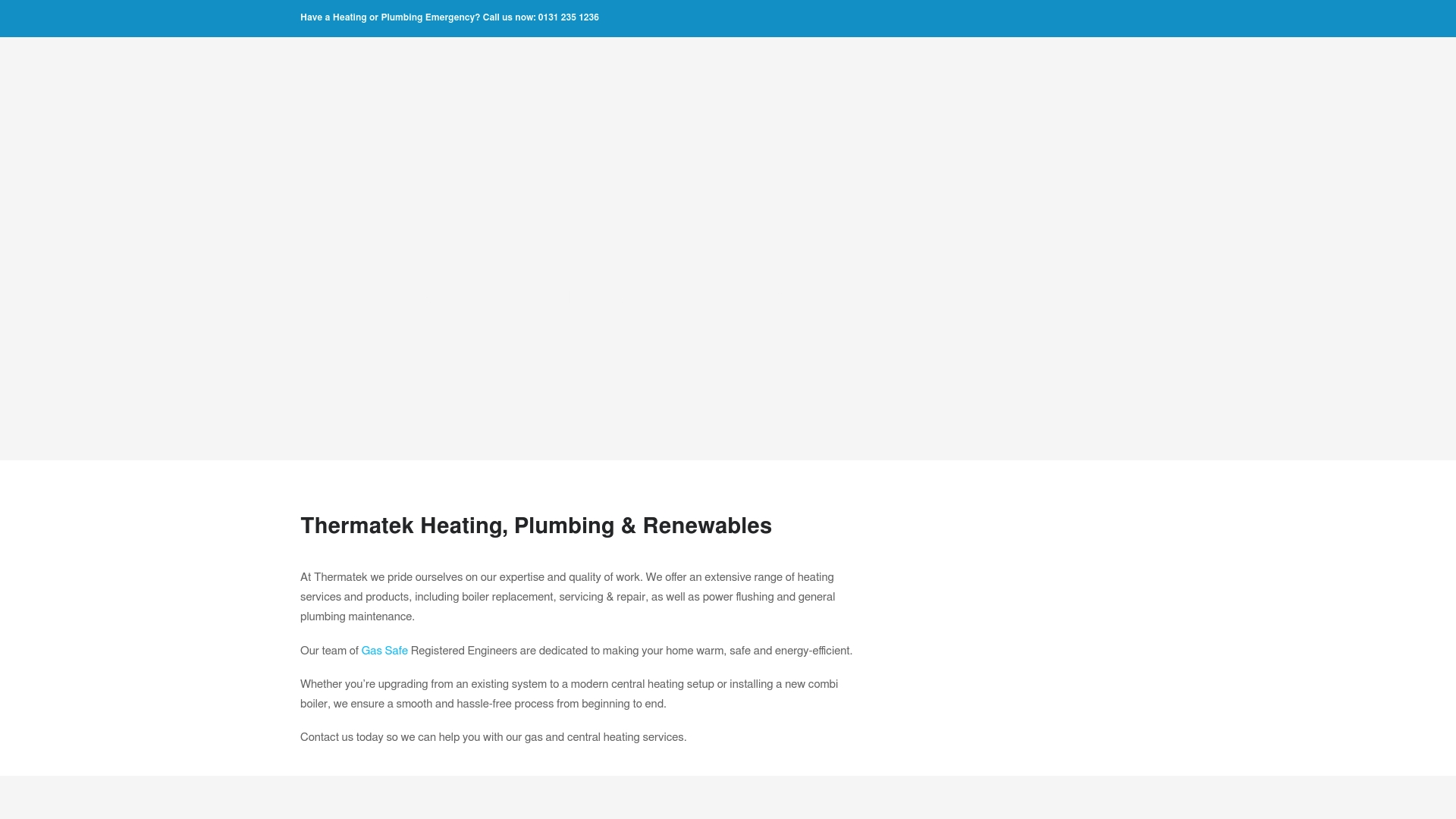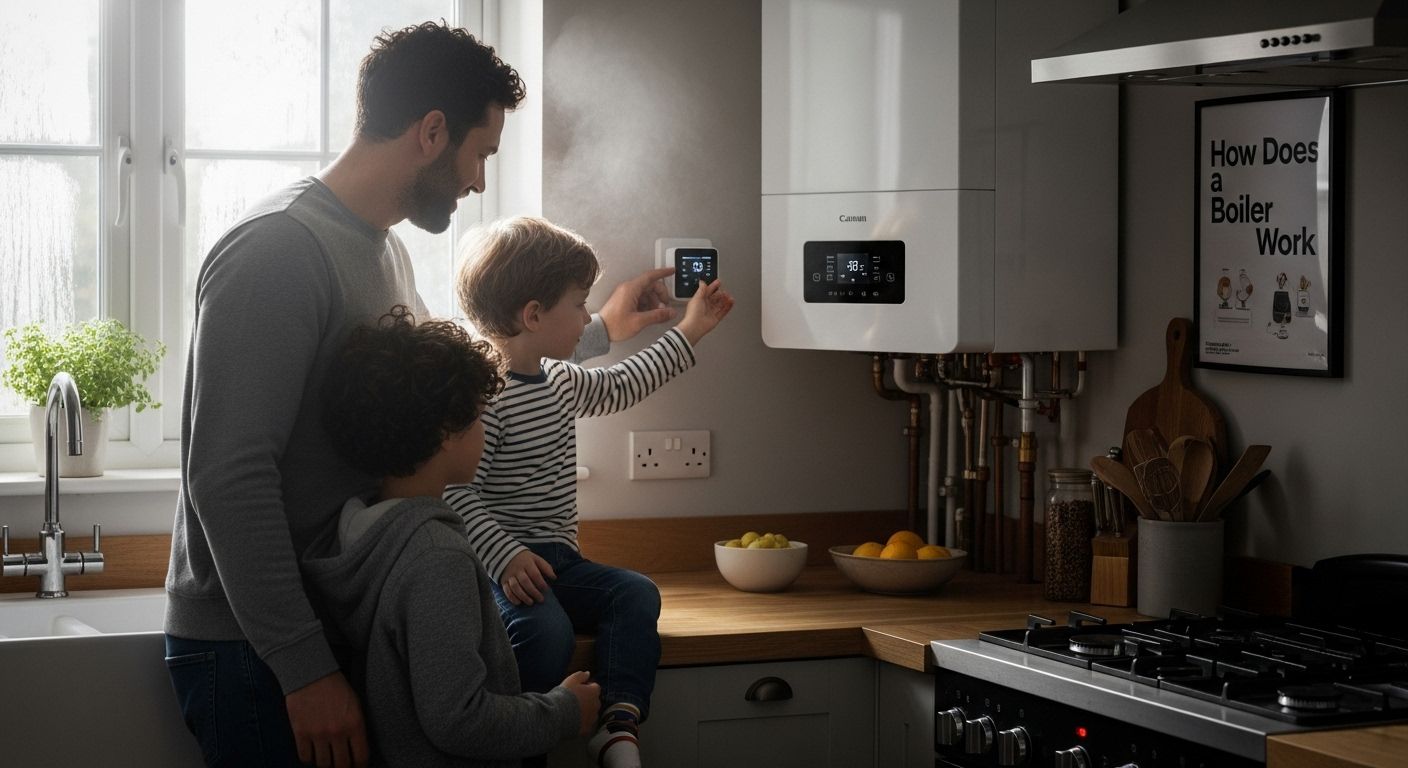Understanding How Does a Boiler Work for Heating
Boilers quietly power most homes and businesses, keeping water hot and spaces warm during those long British winters. Yet despite their importance, many people have no idea how these systems actually work. What might surprise you is that modern condensing boilers can reach efficiency ratings as high as 95 percent, far outshining older models and slashing energy waste. And while the technology may seem complex, understanding it could unlock untapped savings and safer, cosier living for everyone.
Table of Contents
- What Is A Boiler And Its Role In Heating Systems?
- Why Understanding Boiler Function Is Essential For Homeowners
- How Does A Boiler Work? Key Components And Their Functions
- The Importance Of Boiler Efficiency And Maintenance
- Renewable Energy Options In Boiler Technology
Quick Summary
| Takeaway | Explanation |
|---|---|
| Boilers provide efficient home heating | Modern boilers can achieve up to 95% efficiency, reducing energy bills significantly. |
| Regular maintenance extends boiler lifespan | Consistent inspection and upkeep can prevent costly repairs and ensure reliable heating performance. |
| Understanding boiler function aids energy savings | Knowledge of your boiler helps identify inefficiencies and implement effective energy-saving strategies. |
| Safety checks prevent hazardous issues | Regular inspections can prevent risks such as carbon monoxide leaks and system failures. |
| Explore renewable energy options for sustainability | Renewable technologies can reduce carbon emissions by up to 70%, making heating more eco-friendly. |
What is a Boiler and Its Role in Heating Systems?
A boiler is a sophisticated heating appliance designed to generate warmth and provide hot water for residential and commercial spaces. Unlike simple heating elements, boilers operate through a complex thermodynamic process that transforms water or other fluids into heated steam or hot water, which is then distributed throughout a building’s heating system.
Core Function of Boilers in Home Heating
At its fundamental level, a boiler works by heating water or generating steam using various energy sources such as gas, electricity, or oil. This heated medium then circulates through radiators, underfloor heating systems, or other heat distribution networks, effectively warming interior spaces. The mechanism allows for consistent and controlled temperature management, making boilers a critical component in modern heating infrastructure.
The primary roles of a boiler extend beyond mere temperature regulation. They serve multiple crucial functions:
- Generate heated water for domestic use
- Provide consistent central heating across multiple rooms
- Maintain comfortable indoor temperatures during cold seasons
- Offer energy-efficient heating solutions
To help readers quickly grasp the key roles and features of boilers within home heating systems, the following table summarises each function described in the article:
| Boiler Role or Feature | Description |
|---|---|
| Generate heated water for domestic use | Supplies hot water for taps, showers, and household needs |
| Provide central heating across rooms | Delivers consistent heat via radiators or underfloor systems |
| Maintain comfortable indoor temperatures | Ensures even, controllable warmth during cold seasons |
| Enable efficient energy use | High-efficiency models reduce energy consumption and utility costs |
| Support temperature management | Advanced controls regulate and optimise interior climate |
| Offer consistent heat distribution | Reliable operation prevents temperature fluctuations |
| Reduce carbon emissions | Modern boilers lower household environmental impact |
Heating Mechanism and Energy Conversion
Modern boilers exemplify remarkable energy conversion technologies. When fuel is combusted within the boiler’s chamber, it generates thermal energy that transfers to water or another heat transfer medium. This process involves precise temperature control mechanisms that ensure efficient heat distribution while minimizing energy waste.
According to Energy Saving Trust, the efficiency of a boiler can significantly impact household energy consumption, with modern condensing boilers achieving efficiency ratings up to 95%, representing a substantial improvement over older heating systems. This high efficiency translates into reduced energy bills and lower carbon emissions, making contemporary boilers not just heating devices but also environmentally conscious technologies.
Why Understanding Boiler Function is Essential for Homeowners
Comprehending how your boiler operates is far more than a technical exercise it represents a critical aspect of responsible home management. By developing a nuanced understanding of your heating system, homeowners can make informed decisions about maintenance, efficiency, and potential upgrades that directly impact comfort, energy consumption, and household expenses.
Financial and Energy Efficiency Implications
Boiler knowledge empowers homeowners to recognize potential inefficiencies and take proactive measures. Understanding the intricate mechanics of your heating system allows you to identify warning signs of reduced performance, potential energy waste, and opportunities for optimization. When you comprehend how heat generation and distribution work, you can:
- Implement targeted energy-saving strategies
- Recognize early signs of system deterioration
- Make informed decisions about repair versus replacement
- Anticipate potential maintenance requirements
Safety and Preventative Maintenance Considerations
Beyond financial considerations, understanding boiler function is crucial for ensuring household safety. Boilers involve complex interactions between fuel, combustion processes, and heat transfer mechanisms that, if not properly maintained, can pose significant risks. Gas Safe Register emphasizes that regular professional inspections and a basic understanding of your system can prevent potential hazards such as carbon monoxide leaks, system failures, and unexpected breakdowns.
For homeowners seeking more in-depth guidance, our comprehensive guide on boiler replacement offers valuable insights into maintaining and upgrading your home heating infrastructure. Knowing when and how to upgrade your system can lead to substantial long-term benefits in performance, safety, and energy efficiency.
How Does a Boiler Work? Key Components and Their Functions
A boiler operates as a sophisticated thermal energy conversion system, transforming fuel energy into heat through a precisely engineered process. The intricate mechanism involves multiple interconnected components working harmoniously to generate and distribute warmth throughout a building.
Core Operational Mechanism
At the heart of boiler functionality is a complex heat transfer process. When fuel combusts within the boiler’s combustion chamber, it generates intense thermal energy. This heat is transferred to water or another heat transfer medium, typically through a network of pipes and heat exchangers. The heated fluid then circulates through radiators or underfloor heating systems, effectively distributing warmth across interior spaces.
The primary components essential to this process include:
- Combustion chamber where fuel burns
- Heat exchanger for thermal energy transfer
- Circulating pump to move heated water
- Temperature and pressure control mechanisms
- Flue system for exhaust gas evacuation
Technical Components and Energy Transformation
Each boiler component plays a critical role in energy conversion and heat distribution. The combustion chamber generates high temperatures through controlled fuel burning, while the heat exchanger efficiently transfers thermal energy to the water. Circulating pumps ensure consistent fluid movement, maintaining a steady heat supply throughout the heating system.
According to Energy Saving Trust, modern boilers achieve remarkable energy efficiency by optimizing these component interactions. The precision engineering allows for minimal heat loss and maximum thermal output, representing a significant advancement in home heating technologies.
For homeowners seeking comprehensive insights into heating system upgrades, understanding these technical mechanisms provides valuable context for making informed decisions about home heating infrastructure.
The Importance of Boiler Efficiency and Maintenance
Boiler efficiency and regular maintenance are critical factors that directly influence a home’s energy consumption, operational costs, and overall heating system performance. Understanding and implementing strategic maintenance practices can significantly extend equipment lifespan, reduce energy expenditure, and ensure consistent, reliable heating throughout your property.
Economic and Performance Implications
The relationship between maintenance and boiler efficiency is profound and multifaceted. A well-maintained boiler operates at peak performance, consuming less energy while delivering optimal heat distribution. Neglecting routine maintenance can lead to gradual performance degradation, increased energy consumption, and potentially expensive repair or replacement scenarios.
Key economic considerations include:

- Potential energy cost savings of up to 15% through regular maintenance
- Reduced risk of unexpected system failures
- Extended equipment operational lifespan
- Improved overall heating system reliability
Technical Maintenance and Efficiency Strategies
Effective boiler maintenance involves a comprehensive approach that addresses multiple technical aspects. This includes regular cleaning of heat exchangers, checking and replacing worn components, ensuring proper combustion settings, and verifying system pressure and temperature calibrations. Professional inspections can identify potential issues before they escalate into major problems.
According to the National Institute of Standards and Technology, systematic maintenance is crucial for maintaining high system efficiency and preventing performance deterioration. For homeowners seeking expert guidance on comprehensive boiler care, professional assessment can provide tailored recommendations that maximize heating system performance and longevity.
Renewable Energy Options in Boiler Technology
Renewable energy technologies are transforming traditional boiler systems, offering innovative solutions that reduce carbon emissions, enhance energy efficiency, and provide sustainable heating alternatives for modern homes and businesses. These emerging technologies represent a significant shift towards environmentally conscious heating infrastructure.

Emerging Renewable Heating Technologies
Modern renewable boiler technologies integrate advanced energy sources that minimise environmental impact while maintaining high performance standards. These systems leverage alternative energy generation methods to produce heat, moving beyond conventional fossil fuel dependencies. The most prominent renewable technologies currently revolutionising boiler design include:
- Air source heat pumps extracting thermal energy from ambient air
- Ground source heat pumps utilising geothermal underground temperatures
- Solar thermal systems capturing solar radiation for water heating
- Biomass boilers using organic materials as sustainable fuel sources
- Hybrid systems combining multiple renewable energy technologies
Performance and Environmental Benefits
Renewable boiler technologies offer substantial advantages beyond traditional heating systems. They provide more stable energy generation, significantly reduced carbon footprints, and often lower long-term operational costs. The ability to generate heat from naturally replenishing sources represents a fundamental transformation in home and commercial heating strategies.
According to the Energy Saving Trust, renewable heating technologies can reduce household carbon emissions by up to 70% compared to conventional gas boilers. For homeowners interested in exploring sustainable heating upgrades, these innovative solutions offer a promising pathway towards more environmentally responsible energy consumption.
Make Your Boiler Work Smarter – Trust Thermatek for Reliable Heating
Understanding how boilers work helps you spot problems early, stay safe, and avoid rising energy bills. If you are concerned about efficiency, unexpected breakdowns, or simply want to upgrade to modern, energy-saving solutions, you deserve professional support you can trust. With so much depending on your boiler’s performance, it is not worth risking comfort or safety. Let the experts ensure your heating is working its best.

Ready to take control of your home’s heating? Discover how our Gas Safe Registered engineers can help with boiler replacement, maintenance, or renewable energy options. Visit Thermatek Heating for a free quote and see why so many Edinburgh and Midlothian homeowners rely on us for safe, efficient, and cost-effective heating. If you are thinking about a replacement or upgrade, get more details on our boiler replacement services and explore our work with renewable energy solutions. Act now to stay comfortable and protect your investment.
Frequently Asked Questions
What are the main components of a boiler?
The main components of a boiler include the combustion chamber, heat exchanger, circulating pump, temperature and pressure control mechanisms, and the flue system for exhaust gas evacuation.
How does a boiler generate heat for my home?
A boiler generates heat by combusting fuel in the combustion chamber, which produces thermal energy. This heat is then transferred to water or another medium via the heat exchanger, allowing it to circulate through radiators or underfloor heating systems to warm the living spaces.
Why is boiler efficiency important for homeowners?
Boiler efficiency is crucial as it directly affects energy consumption and heating costs. A more efficient boiler operates using less fuel to produce the same amount of heat, leading to lower energy bills and reduced carbon emissions.
How can I maintain my boiler for optimal performance?
Regular maintenance of a boiler includes cleaning heat exchangers, checking and replacing worn components, verifying combustion settings, and ensuring proper system pressure and temperature. Professional inspections can help identify potential issues before they escalate.

